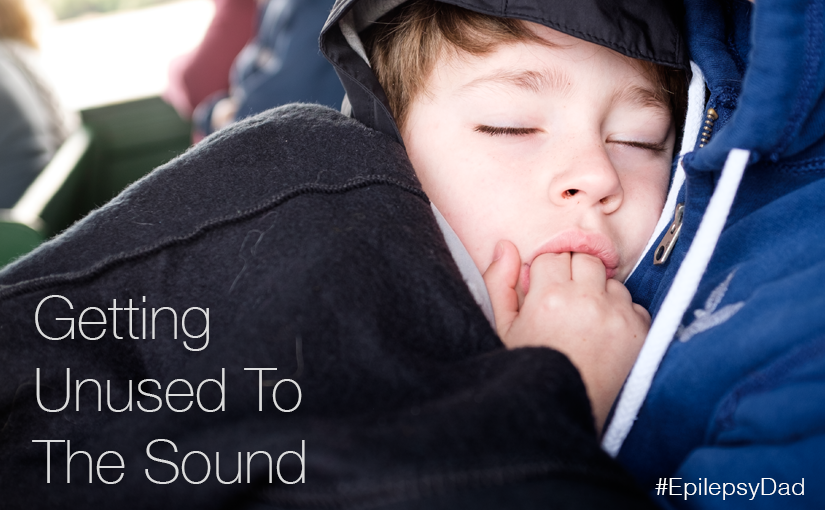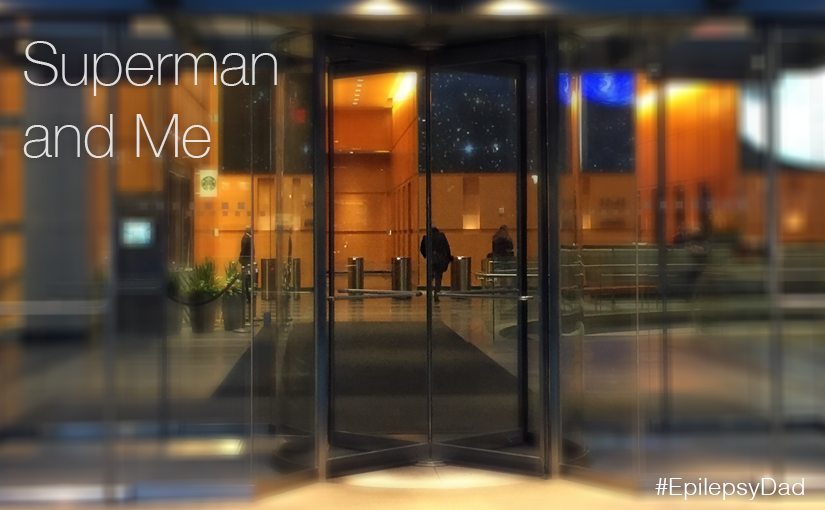Superman And Me
When I push through the huge revolving doors at my office, I undergo a transformation. Superman had his telephone booth where he changed from a reporter to the Man of Steel. I have a spinning wall of metal and glass where I morph from the father of a kid with epilepsy in to the Man of PowerPoint.

Once I step to the other side, I hide my true identity. No matter how little sleep I got the night before or many seizures my son had that morning, I smile at the guards as I pass through security. I say ‘Good morning‘ to my fellow passengers in the elevator and the people I pass in the hall. Inside the walls of my own Daily Planet, I separate my two lives and only show the person that my colleagues expect to see.
The thing about leading two lives is that they are impossible to separate. Clark Kent doesn’t stop being Superman when he wears his glasses. Both identities share the same thoughts and emotions and super powers. He thinks about saving Metropolis while sitting at his desk. He listens for the call of someone who needs him while he grabs coffee in the breakroom. He can’t be one or the other when he is both, regardless of which mask he wears.
For an ordinary person, it’s exhausting maintaining this separation every day. On bad seizure days, I struggle to keep my focus on my work. My thoughts often find their way back to my son, wondering if the seizures have stopped or how he is doing in school. I check my phone constantly to see if I missed a call or a text from my wife letting me know that I am needed somewhere else. Superman only had a city to protect. My son is my world.
With every interaction, it takes energy to adjust my mask and ensure that it hides the turmoil inside. After a night without sleep, it’s especially difficult but there is no other option. I have to be able to focus on my work. My job is what pays the bills and provides us with health insurance. The weight of responsibility and the need to perform often feels like it would be too much even for Superman. And yet, somehow, this is my every day.
I don’t always succeed. There are days where it is all too much. Try as I might to hide it, pieces of my reality are visible to the outside world.
Their planet crumbled but Superman, he forced himself
To carry on, forget Krypton, and keep going
~Crash Test Dummies “Superman’s Song”
On those days, I do my best to carry on and keep going, too. I will myself to get to the end of the day so that I can go back through those revolving doors. When I step out onto the concrete, I start to undo my disguise. With every step that takes me closer to home, I shed the layers of my corporate costume. No longer needing to exert the energy to maintain my facade, I drop my mask to the ground.
As I take those last few steps up to our front door, I open myself up and let the joy and fear and hope and love wash over me. Turning the doorknob, I can already hear laughter from the other side of the door. Pushing the door open, I’m rewarded for my impossible effort during the day with “Daddy!” and I let out a cleansing exhale that I’ve held in all day.
This must be how Superman feels when he takes off his glasses at the end of the day. Finally, I can be who I am supposed to be.
To CBD Or Not To CBD
There is no shortage in the news of sensational headlines highlighting the miracles of CBD and medical marijuana as a treatment for epilepsy.
- Parents Say Medical Cannabis is “Miracle Drug” for Children
- Marijuana stops child’s severe seizures
- Medical marijuana helps stem 6-year-old’s seizures
The articles write about children who tried any number of medications that failed to control their hundreds of seizures a day but were all but cured by CBD.
After two years of uncontrolled seizures, we were so desperate for something that could help our son so we brought CBD up with our doctors. At the time, it was illegal in Pennsylvania and our doctors weren’t comfortable talking about it because they had no experience with it. We were unable to get into the CBD trial happening at our hospital so we discussed moving back to Colorado. Our doctors said there was only limited testing on the drug and that it was focused on specific syndromes associated with epilepsy. There was little research on its long-term effects or its interactions with the antiepileptic medications. Another concern we shared with the doctors was the inconsistent quality coming out of many CBD providers. At the time, we made the decision to not try CBD because it wasn’t worth the risk of introducing a drug with so many unknowns. We had seen what a bad reaction to a medicine looks like for our son and we weren’t willing to risk the progress that we had made.
My son was still having seizures every day so we started to make plans for a VNS surgery. I struggled for weeks with the decision and, even after it was made, I agonized over the thought of surgery for my son. Then, in April of 2016, medical marijuana was legalized in Pennsylvania. We again brought up CBD as something to try before we pursued the surgery and we were referred to doctors in Colorado. The waiting list to get an appointment was so long. Even after a trip to Colorado, we were not able to get an appointment. We spoke to one of the doctors from our neurology department that was familiar with CBD and decided to give it a try.
When the bottle of oil arrived, I tried to temper my expectations. We’ve tried and been disappointed by too many medications already and, regardless of the press clippings, I knew that, for every sensational success story, there were countless stories with less than miraculous results. It may not work at all, or my son may have a negative reaction, as he has had from many other treatments.
The dosing to introduce CBD is slow and we were told it could take months before we saw the full effects. As the parent of a child with epilepsy, I’m no stranger to hearing about patience. That practice doesn’t make it any easier, especially watching my son continue to have seizures. But we started the treatment with a hopeful, open mind and as much patience as we could muster.
After a few weeks, we were up to a functional dose but we didn’t notice any difference in my son’s seizure burden. We increased the dosage again and continued to wait. By the third month, we did see a slight decrease in seizures but nothing like the stories in the news and nothing we could directly attribute to the CBD. With the advice of our doctors, we decided to stay at the dose we were on and adjusted one of my son’s other medications. The result was our first few small stretches of seizure-free days.
I was grateful for those days but I was also disappointed. I had hoped that the CBD would be the miracle drug we were looking for. I hoped it would stop his seizures and that we could get off the other medicine and the ketogenic diet. So far, we haven’t been able to reduce any other medications. Ultimately, we’re not quite sure how much CBD is actually helping my son or if it is helping him at all. This is how it goes sometimes with any drug that tries to control something as complex as the brain. You try it, see if anything changes or gets worse, and then decide what to try next.
For us, I think our experiment with CBD will be coming to an end. We’re going to adjust his regimen and, once those changes take hold, we will start weaning off CBD. If anything indicates that it was working, we will reevaluate. I expect, though, that it will be another medicine to add to the list of ones that didn’t work for us.


